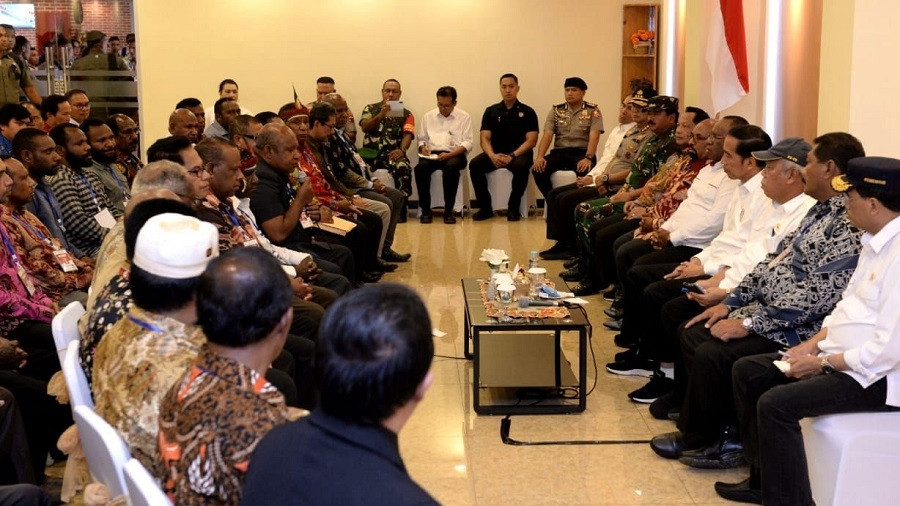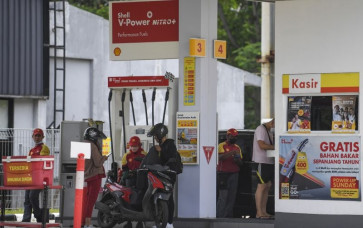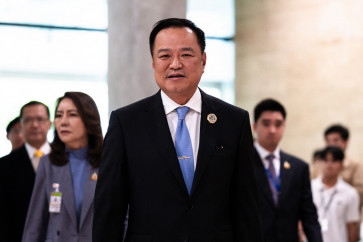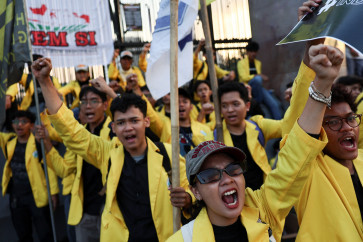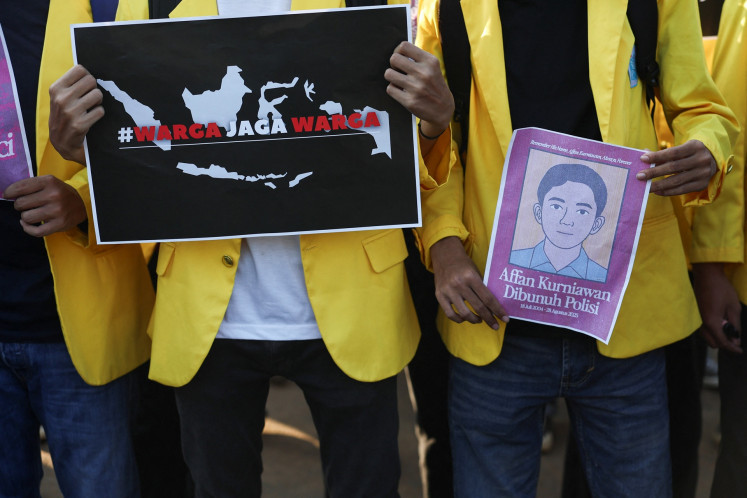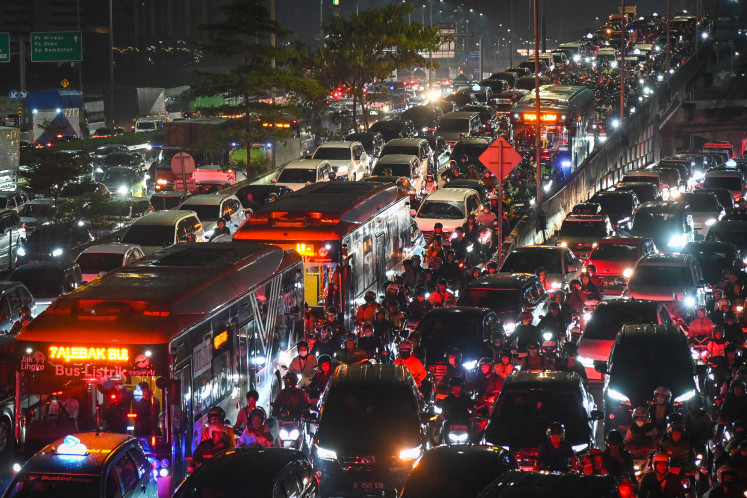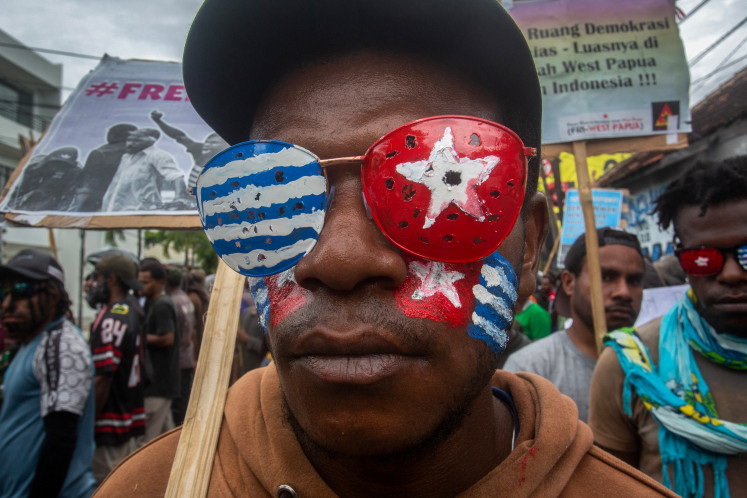Popular Reads
Top Results
Can't find what you're looking for?
View all search resultsPopular Reads
Top Results
Can't find what you're looking for?
View all search resultsThe detriments of Papua separatist campaigns
These historical complexities are more often than not misunderstood by many people, leading to the false conclusion that Papua was colonialized by Indonesia.
Change text size
Gift Premium Articles
to Anyone
“If there was to be a consensus reached on historical facts with regard to Indonesia and West Papua, how would that change the conditions on the ground right now?” This question was part of a closing statement made in a webinar held by the Foreign Ministry in cooperation with The Jakarta Post on July 29.
To answer the provoking question, it is important to briefly recall the theme of the discussion, namely the historical and legal facts surrounding Papua, which is related to the long-standing voices of separatism there. The root of Papua’s separatist movement may be traced back to the Netherlands’ reluctance to return the land back to Indonesia even after the country’s independence. The former colonial master retained de facto control over Papua, setting aside Indonesia’s lawful de jure claims of Papua until it finally conceded and signed the New York Agreement in 1962.
These historical complexities are more often than not misunderstood by many people, leading to a false conclusion that Papua was colonialized by Indonesia and, therefore, must exercise the right to self-determination. Under international law, as was reaffirmed by the United Nations, Papua has been an integral part of Indonesia and as such, the premise of Indonesia’s colonization of Papua is a fallacy.
Five decades after the landmark agreement, however, advocates of separatism are still persisting to win the unwinnable, notwithstanding the unequivocal international society’s view on territorial integrity: There exists no right to secede under international law.
The opinions on why Papua should secede from Indonesia is usually based on two main arguments. First, Papua has an unfulfilled self-determination right because it was colonialized. This argument is invalid from the outset, and that is the very reason why the UN has never included Papua in the Non-Self-Governing Territories (NSGT) list, which groups colonial territories that have not yet exercised their right to self-determination. Second, there are a plethora of issues plaguing Papua, ranging from human rights abuses and discrimination to unequal development. This second argument is at times, unfortunately, accompanied by a flawed, if not detrimental, solution: separatism.
Why does separatism become the only solution to the aforementioned problems? The government has not yet been proven to be unwilling to solve these issues. Under Joko “Jokowi” Widodo’s presidency, many things have been improved. Just to name a few: the construction of the trans-Papua road that will incentivize development, the new presidential instruction to accelerate development in Papua and West Papua, and the newly enacted Law No. 2/2021, which extends the special autonomy for Papua and West Papua.
Separatism has always been frowned upon by international and national law alike. Former UN secretary-general U Thant even stated that “as an international organization, the United Nations has never accepted and does not accept and I do not believe will ever accept the principle of secession of a part of its member states”.
Respect for territorial integrity is one of the primary foundations of international relations and this in itself blocks any right to secede. The judicial bodies of Russia, Canada and Spain have ruled that their national law prohibits the secession of Tatarstan, Quebec and Catalonia, respectively. Territorial integrity has always been an issue that every state in the world takes in the most serious manner.
This is why the voices of separatism serve only to complicate the situation in Papua. Even without the issue of separatism, the government has already been preoccupied with an array of other issues.
Regardless, these are domestic issues the government is equipped to solve. The separatist movement muddles these issues and consequently, makes it very difficult for both the local governments in Papua and the central government to address the more pressing problems of, for example, human rights and the development gap. The killing of 31 trans-Papua construction workers at the hands of a Papuan separatist group is one of the many examples of this unproductive campaign.
This is where the question posed at the end of the webinar may be answered. International law rules in favor of the status of Papua as an integral part of Indonesia. Separatist movements are mostly fueled by a misunderstanding of historical facts and their legal consequences under international law.
It is, therefore, paramount to set the record straight, to understand how international law views Papua’s status by examining the relevant historical facts and to reach a consensus that separatism is not only impossible but also should never be viewed as an exclusive solution to the Papua problem.
This consensus will serve as a foundation for a productive joint effort in finding the most appropriate solution to the existing issues: Papuan separatist movements may divert focus, resources and energy from trying to win the unwinnable and the government will be able to devote its attention without the intervention of unnecessary security issues. This will also enable more productive criticism and dialogues on how to best approach these issues without threats of separatism foreshadowing them.
Any endorsement of separatism in Papua is not just a violation of Indonesia’s territorial integrity and sovereignty, but also a counterproductive action that might trigger new security concerns that ultimately impede efforts to resolve the Papua problems.
Separatism is not only misleading and condemned by international law; it is also a harmful approach that might set aside the most pressing issues at hand.
***
The writer is a foreign service officer currently assigned to the Legal Affairs and Political Security Treaties Directorate of the Foreign Ministry. The opinions expressed are personal.

